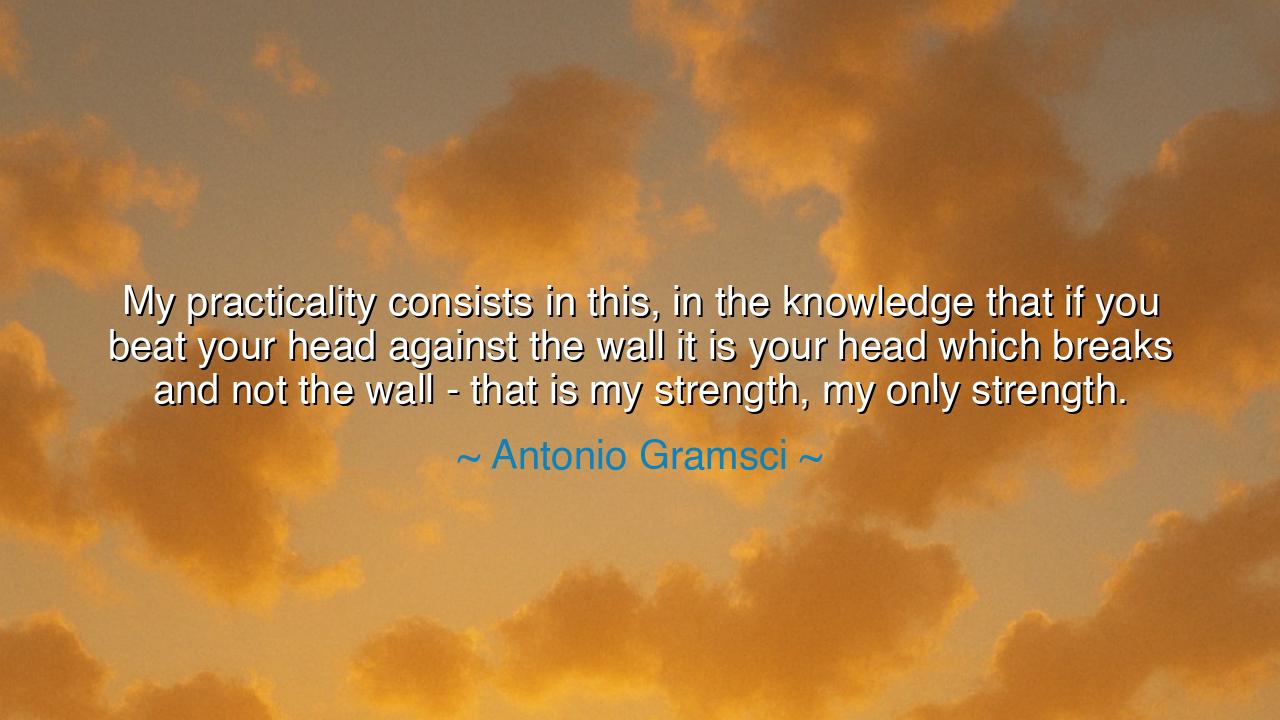
My practicality consists in this, in the knowledge that if you
My practicality consists in this, in the knowledge that if you beat your head against the wall it is your head which breaks and not the wall - that is my strength, my only strength.






Hear the voice of Antonio Gramsci, the Italian thinker imprisoned for his convictions, who wrote with clarity born of hardship: “My practicality consists in this, in the knowledge that if you beat your head against the wall it is your head which breaks and not the wall—that is my strength, my only strength.” In these words, there is no softness, no dream of easy triumphs, but a hard and shining truth: to know reality, to accept limits, and to endure with wisdom rather than destroy oneself in futile struggle. This was the practicality of a man who endured chains yet kept his spirit unbroken.
For what is the meaning of his image? The wall is reality—unyielding, immovable, indifferent to the will of man. The head is the human spirit when it rages blindly, refusing to see what cannot be changed by sheer force. To beat against the wall without thought is to waste life, to shatter one’s own strength while the wall stands untouched. But to recognize this truth, to know when resistance must take another form, is a deeper kind of strength. Gramsci’s strength was not in violent assault against impossibility, but in the endurance of wisdom, in the patience to live and fight another day.
The ancients, too, spoke of such wisdom. The Stoic philosopher Epictetus taught that freedom lies not in changing what is beyond us, but in mastering our response to it. “Do not demand that events happen as you wish,” he wrote, “but wish them to happen as they do, and you will go on well.” This is not surrender, but the redirection of energy away from futile blows toward fruitful paths. In this, Gramsci stood in the tradition of those who knew that true strength is measured not by reckless defiance, but by endurance, patience, and clarity of vision.
History offers us an example in the life of Nelson Mandela. For 27 years he sat behind prison walls, a man whose head might have shattered if he had tried endlessly to batter those walls with rage. Instead, he preserved himself, disciplining his mind, holding his vision. When the time came, he emerged not broken, but ready, and he transformed a nation. Like Gramsci, he knew that the wall could not be broken by despair; it could only be outlasted and overcome through strategy, endurance, and wisdom.
The deeper wisdom of Gramsci’s words is this: reality must be faced, not denied. Many fall into weakness because they refuse to see that their fight is against an unyielding wall. They waste themselves, pouring strength into hopeless battle, and break themselves in bitterness. But the wise man, though he suffers, knows the shape of the world around him. He bends when bending is needed, resists when resistance is possible, and never mistakes his own limits for defeat. His practicality is his shield; his endurance is his victory.
The lesson for us is clear: do not waste yourself in battles you cannot win. Recognize when the wall is immovable, and instead turn your strength to where it can bring change. This does not mean abandoning hope, nor abandoning the struggle for justice. It means fighting with wisdom, conserving your strength, and knowing that your spirit is greater than any single obstacle. To break your head is to lose yourself; to preserve your strength is to remain ready for the moment when change becomes possible.
Practical action flows from this: in your life, when you face hardship, ask yourself—am I striking the wall in vain, or am I finding the right path around it? Do not let anger consume you in fruitless resistance. Instead, anchor yourself in patience, in endurance, in clarity. Save your strength for the struggles that matter, for the battles where victory can be won. In this lies the essence of practicality and the secret of lasting strength.
So remember Gramsci’s teaching: if you beat your head against the wall, it is your head that breaks, not the wall. Wisdom is to know this truth, strength is to accept it, and victory is to endure until the wall itself crumbles with time. For the greatest leaders and the bravest souls are not those who shatter themselves against impossibility, but those who preserve their strength for the day when the impossible becomes possible.






AAdministratorAdministrator
Welcome, honored guests. Please leave a comment, we will respond soon